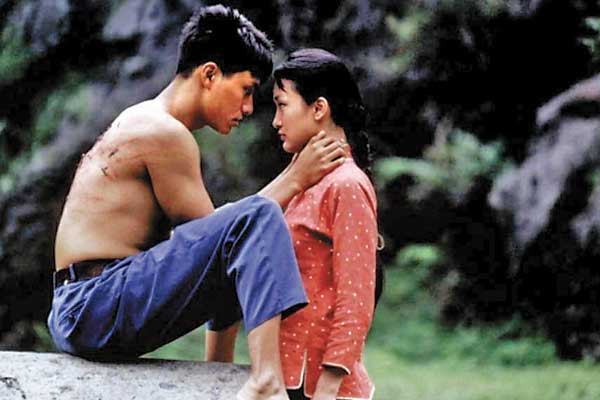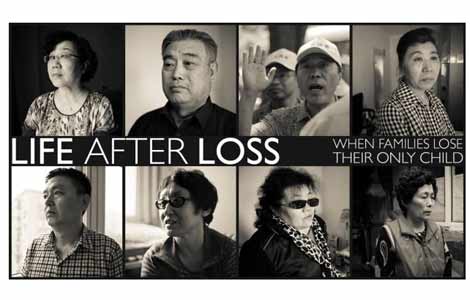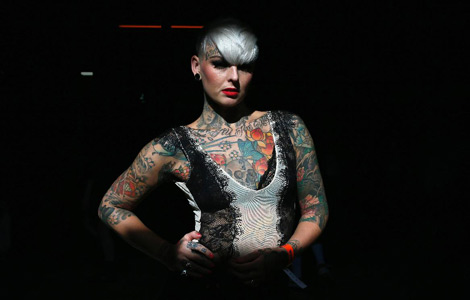Tales of two countries
Updated: 2013-09-30 23:31
By Raymond Zhou (China Daily)
|
||||||||
Dai Sijie writes and films Chinese stories that are lyrically beautiful and also popular with audiences in Western countries. Now his underutilized skill is put to use in projects designed with cross-cultural appeal, writes Raymond Zhou.
Dai Sijie is like a bridge. He connects the medium of literature with that of film; and at the same time he links up the world of China, where he was born and grew up, with that of France, where he attained fame, as both a novelist and a film director.
 |
|
A scene from film Balzac and the Little Chinese Seamstress features Zhou Xun (right) and Chen Kun. [ provided to China Daily] |
I had always wanted to talk to Dai ever since I saw Balzac and the Little Chinese Seamstress a decade ago. Another reason is that he is a Chinese expatriate who mastered a foreign language, French in this case, to the point of publishing professional writings in it — a point that is inspiring to me.
Imagine my surprise when I finally met him during the 2013 Montreal World Film Festival, where both he and I were serving as jury members, and he told me nobody expected his novel of the same name, upon which the film was based, to be a success. Not his publisher. Not even he himself. The publisher reluctantly agreed to an initial print run of 3,000 copies, partly because they saw it as an homage to great literature, with Balzac in the title and all.
Dai, born in 1954 in Fujian province and sent down to Sichuan as a youth, first went to France in 1984 to study film. He got into a prestigious school that enrolled only 20 students a year in its film-directing program. "Doing my first feature was pretty easy," he said. Unlike in other countries, his second and third movies ran into more difficulties and failed to garner the kind of attention his debut feature received. "They were French stories with a supernatural touch," he said.
Then came the unexpected success of Balzac, and a film adaptation was inevitable. He and his film company cast Zhang Ziyi in the role of the female lead, as the latter had just become an international star with Crouching Tiger, Hidden Dragon. But then Dai ran into Zhou Xun and thought Zhou was a better fit.
The trio of leads in this movie — Zhou Xun, Chen Kun and Liu Ye — were not yet stars when Dai cast them. In just a couple of years, all three of them would go on to be bona fide A-listers in Chinese showbiz. You have to give credit to Dai for having that kind of foresight — or maybe luck.
"This is a romantic story and it is about books. So, I wanted actors to be good-looking, not people on the street. This movie would not work with realism," Dai explained. Some of the story elements were from his own life. "A friend of mine dated a local girl while we were both 'sent-down youths' in rural Sichuan. The girl in real life was a farmer and had got some basic education. She eventually left for the city."
When I asked Dai about the possible homosexual sentiments between the two male characters, he said it was not intentional. He was shocked when he first heard it from a college student in America who read the novel. "That young man told me it was the most beautiful gay story he had seen and I told him there was nothing between them but friendship."
Now that he has had more time to mull over the issue, he believes there are many people of the same sex in their early youth whose friendship is so intense it borders on romantic love, yet there is no sexual intimacy involved. Dai denies he designed this kind of relationship to pander to Western tastes, but he admits that, having stayed in France for so long and having immersed himself in French literature, he intuitively understands what they like on the page or the screen.
"It's not a bad thing," he adds. "I always thought this kind of cross-cultural skill would come in handy for China when it needs better communication with the Western world."
As a matter of fact, he feels unappreciated back in China, where his success in France as a filmmaking author has received scant attention. In China you are either a writer or a director. Sure, you can direct a script you wrote, but few authors have crossed over to filmmaking with equal aplomb or acclaim. Besides, he did it backwards, making it in films and then crossing over to writing, a move that defies logic in China.
Albeit unanticipated, his French-language novels have received global distribution, with more than two-dozen language versions for some. "If you find traces of Flaubert or Balzac in them, well, I consider it flattering because theirs are the works I have been studying all these years." However, the movie failed to be categorized as a co-production because the authorities at that time saw Balzac as too glaring of a foreign influence.
Dai now lives part of his time in Chengdu, Sichuan province. "A few years ago, I could still find some common ground with the film industry in China," he said. "But now it is gripped by commercialism. I shouldn't succumb to that, should I?"
Dai's new project is a romance movie that straddles two cultures and two cities. Night Peacock, set in Chengdu and Paris, is about a French woman who falls in love with two Chinese men. "As someone comfortable with two cultures, I hope to convey with this film the interaction of human emotions from both worlds, and especially the beauty of these two cities," he said during an April press conference in the Chinese city.
The movie, which will be Dai's first feature since The Chinese Botanist's Daughters in 2006, is set to go into production later this year. In the leading roles are Yu Shaoqun, French actress Maiwenn Le Besco and Liu Ye, a veteran from Balzac and the Little Chinese Seamstress and whose wife happens to be French.
An even more ambitious project is on the horizon. Dai is adapting Yu Hua's Brothers into a feature film, which he will also direct. "Yu is a good friend of mine and he trusts me completely. But we have many difficulties to overcome before the project can go through."
I suggested to him that maybe it would be more feasible to do Brothers as a stage play first. "Yu Hua's To Live has been playing to sold-out runs," I said. "You can preserve more of the essence with a play than with a movie adaptation."
"Well, Brothers was turned into a play back in 2006, one year after the book came out. It starred Xu Zheng, who is now a superstar crossing over to film directing. He said he would still be interested in acting in the film if it can get approval," said Dai.
That would surely add a lot of depth to Xu's credentials as a comedian. And with the book's reputation in the West and Dai's knack for making Chinese stories resonate with Western audiences, it has a good chance of breaking out of the slump most Chinese screen hits have found in the Western market.
Contact the writer at raymondzhou@chinadaily.com.cn.

 Victoria Beckham S/S 2014 presented during NYFW
Victoria Beckham S/S 2014 presented during NYFW
 'Despicable' minions upset Depp's 'Lone Ranger' at box office
'Despicable' minions upset Depp's 'Lone Ranger' at box office
 'Taken 2' grabs movie box office crown
'Taken 2' grabs movie box office crown
 Rihanna's 'Diamonds' tops UK pop chart
Rihanna's 'Diamonds' tops UK pop chart
 Fans get look at vintage Rolling Stones
Fans get look at vintage Rolling Stones
 Celebrities attend Power of Women event
Celebrities attend Power of Women event
 Ang Lee breaks 'every rule' to make unlikely new Life of Pi film
Ang Lee breaks 'every rule' to make unlikely new Life of Pi film
 Rihanna almost thrown out of nightclub
Rihanna almost thrown out of nightclub
Most Viewed
Editor's Picks

|

|

|

|

|

|
Today's Top News
Chinese tourists affected by US govt shutdown
Impasse in Congress shuts down services
US big 3 automakers sales slowdown
Market in antiques booms in Shanghai
Manufacturing shows positive growth
Beijing to issue air quality warnings
China's railways see record traffic
Search for fishermen continues
US Weekly

|

|







